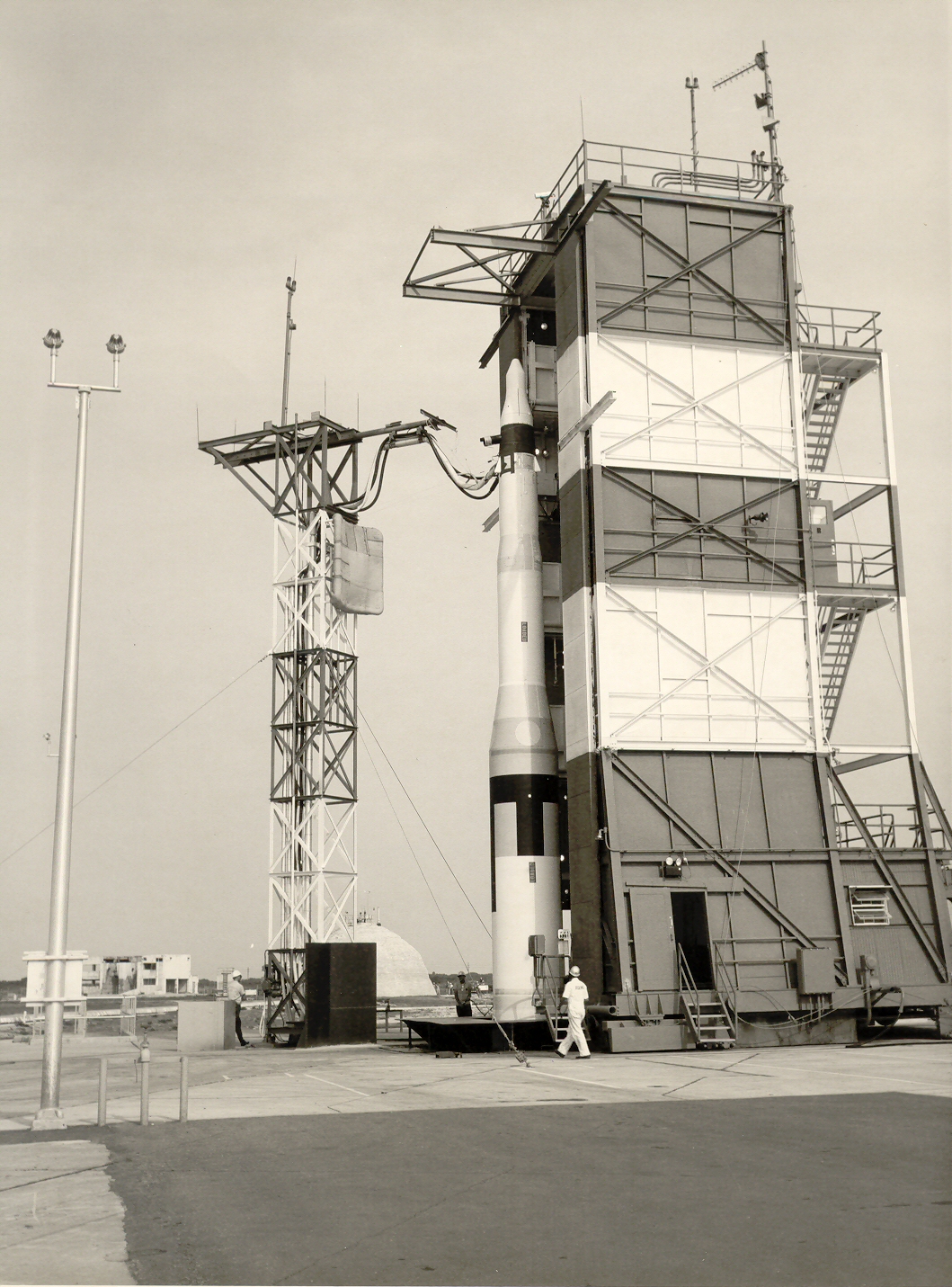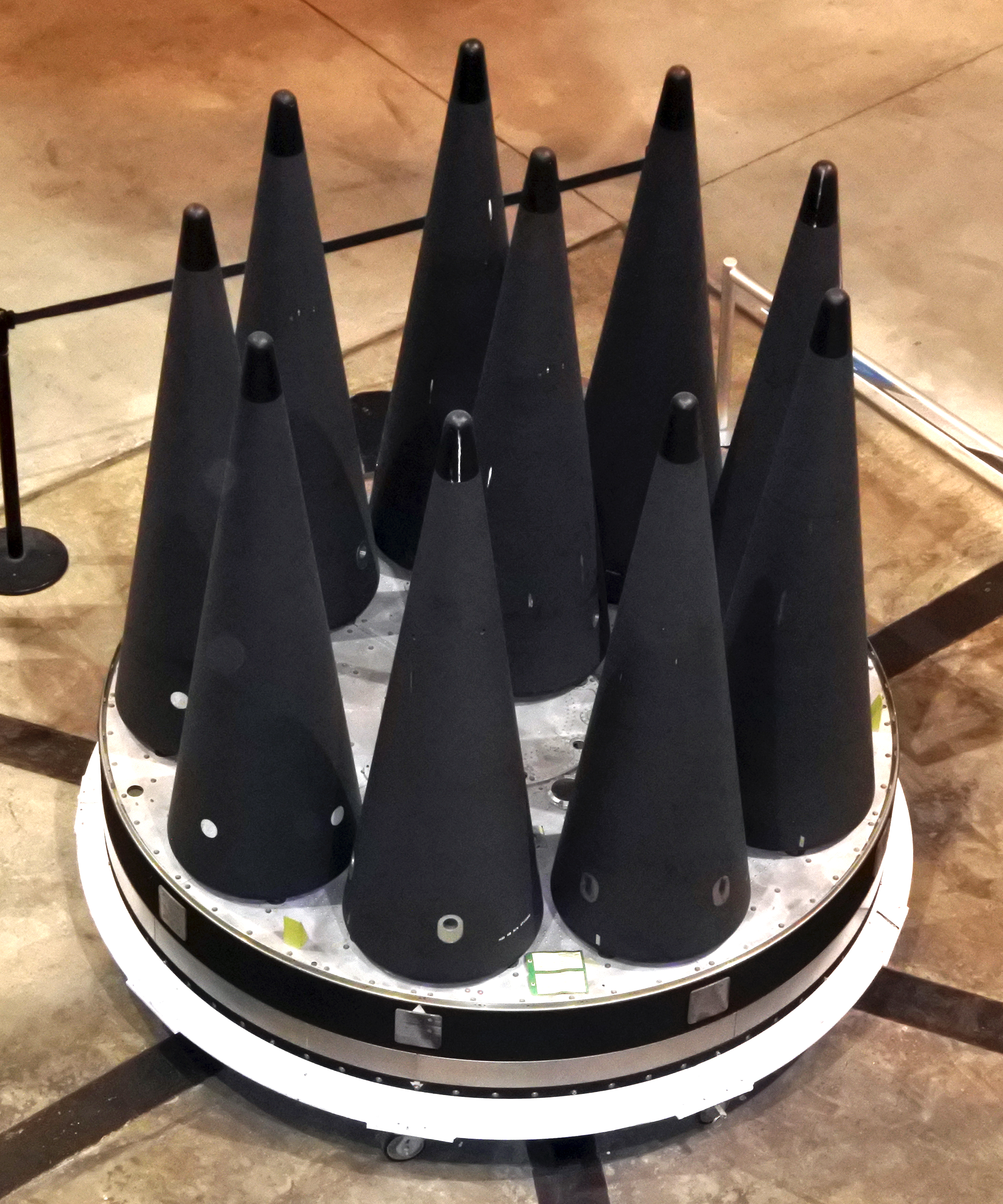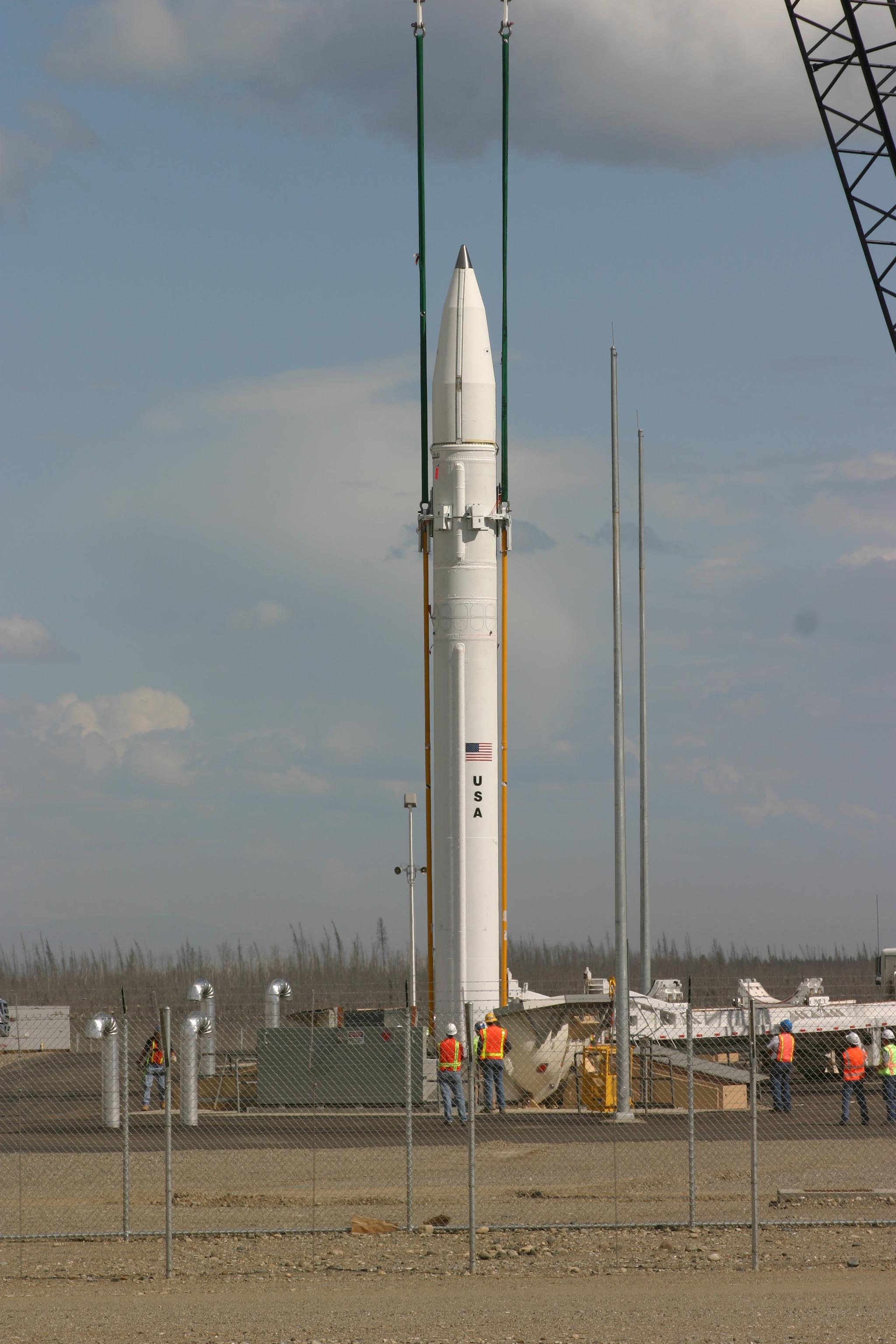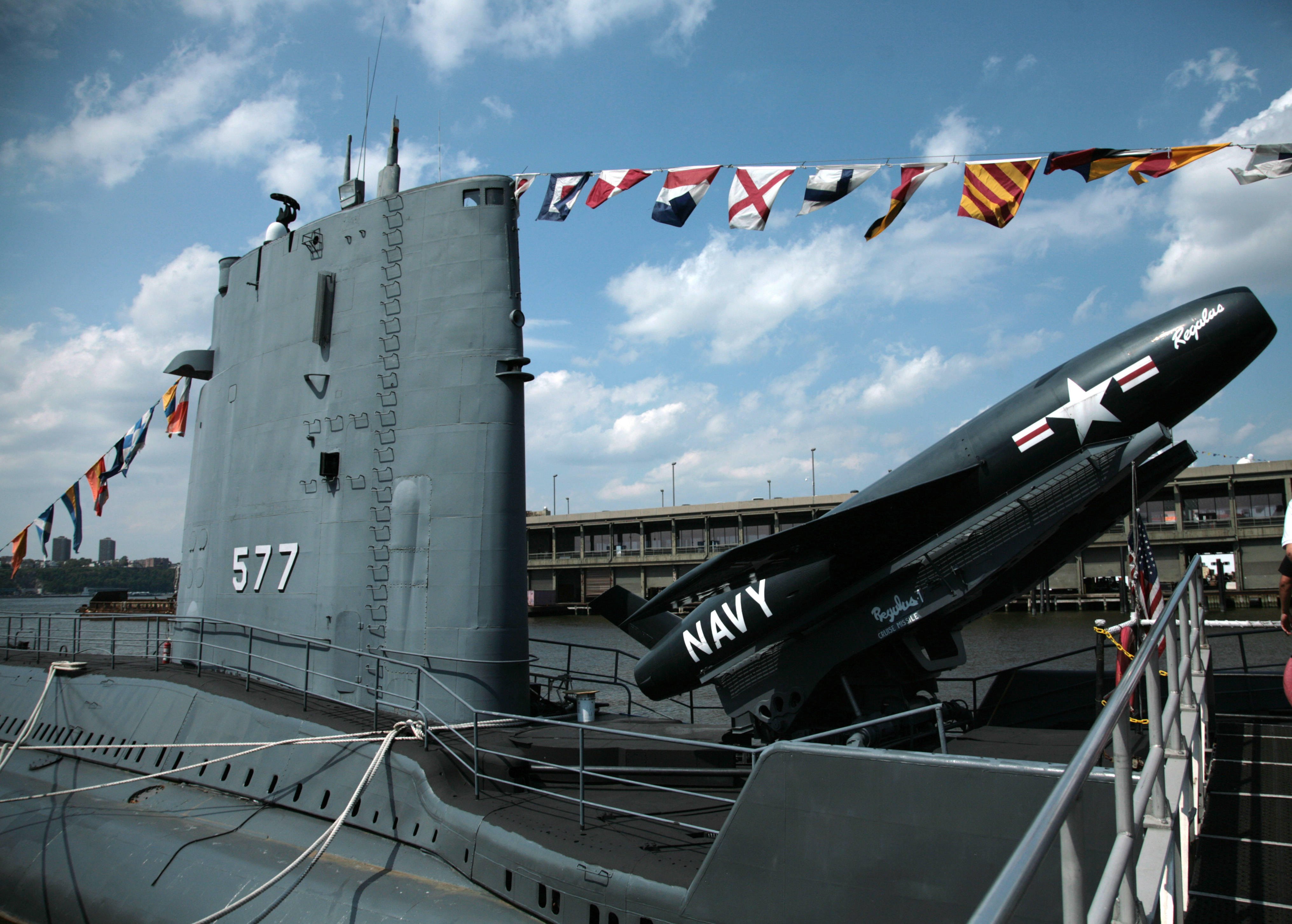|
LGM-30F Minuteman II
The LGM-30 Minuteman is an American land-based intercontinental ballistic missile (ICBM) in service with the Air Force Global Strike Command. , the LGM-30G Minuteman III version is the only land-based ICBM in service in the United States and represents the land leg of the U.S. nuclear triad, along with the Trident (missile), Trident submarine-launched ballistic missile (SLBM) and nuclear weapons carried by long-range strategic bombers. Development of the Minuteman began in the mid-1950s when basic research indicated that a solid-fuel rocket motor could stand ready to launch for long periods of time, in contrast to liquid-fueled rockets that required fueling before launch and so might be destroyed in a surprise attack. The missile was named for the colonial minutemen of the American Revolutionary War, who could be ready to fight on short notice. The Minuteman entered service in 1962 as a Deterrence theory, deterrence weapon that could hit Soviet Union, Soviet cities with a secon ... [...More Info...] [...Related Items...] OR: [Wikipedia] [Google] [Baidu] |
Intercontinental Ballistic Missile
An intercontinental ballistic missile (ICBM) is a ballistic missile with a range greater than , primarily designed for nuclear weapons delivery (delivering one or more thermonuclear warheads). Conventional, chemical, and biological weapons can also be delivered with varying effectiveness, but have never been deployed on ICBMs. Most modern designs support multiple independently targetable reentry vehicles (MIRVs), allowing a single missile to carry several warheads, each of which can strike a different target. Russia, the United States, China, France, India, the United Kingdom, and North Korea are the only countries known to have operational ICBMs. Early ICBMs had limited precision, which made them suitable for use only against the largest targets, such as cities. They were seen as a "safe" basing option, one that would keep the deterrent force close to home where it would be difficult to attack. Attacks against military targets (especially hardened ones) still demanded th ... [...More Info...] [...Related Items...] OR: [Wikipedia] [Google] [Baidu] |
Trident (missile)
The Trident missile is a submarine-launched ballistic missile (SLBM) equipped with multiple independently targetable reentry vehicles (MIRV). Originally developed by Lockheed Missiles and Space Corporation, the missile is armed with thermonuclear warheads and is launched from nuclear-powered ballistic missile submarines (SSBNs). Trident missiles are carried by fourteen United States Navy s, with American warheads, as well as four Royal Navy s, with British warheads. The missile is named after the mythological trident of Neptune. Development In 1971, the US Navy began studies of an advanced Undersea Long-range Missile System (ULMS). A Decision Coordinating Paper (DCP) for the ULMS was approved on 14 September 1971. ULMS program outlined a long-term modernization plan, which proposed the development of a longer-range missile termed ULMS II, which was to achieve twice the range of the existing Poseidon (ULMS I) missile. In addition to a longer-range missile, a larger submarine ... [...More Info...] [...Related Items...] OR: [Wikipedia] [Google] [Baidu] |
Multiple Independently Targetable Reentry Vehicle
A multiple independently targetable reentry vehicle (MIRV) is an exoatmospheric ballistic missile payload containing several warheads, each capable of being aimed to hit a different target. The concept is almost invariably associated with intercontinental ballistic missiles carrying thermonuclear warheads, even if not strictly being limited to them. By contrast, a unitary warhead is a single warhead on a single missile. An intermediate case is the multiple reentry vehicle (MRV) missile which carries several warheads which are dispersed but not individually aimed. Only the United States, the United Kingdom, France, Russia, China and India are currently confirmed to have deployed MIRV missile systems. Pakistan is developing MIRV missile systems. Israel is suspected to possess or be in the process of developing MIRVs. The first true MIRV design was the Minuteman III, first successfully tested in 1968 and introduced into actual use in 1970. The Minuteman III held three small ... [...More Info...] [...Related Items...] OR: [Wikipedia] [Google] [Baidu] |
Anti-ballistic Missile
An anti-ballistic missile (ABM) is a surface-to-air missile designed to counter ballistic missiles (missile defense). Ballistic missiles are used to deliver nuclear weapon, nuclear, Chemical weapon, chemical, Bioagent, biological, or conventional weapon, conventional warheads in a ballistics, ballistic flight trajectory. The term "anti-ballistic missile" is a generic term conveying a system designed to intercept and destroy any type of ballistic threat; however, it is commonly used for systems specifically designed to counter intercontinental ballistic missiles (ICBMs). Current counter-ICBM systems There are a limited number of systems worldwide that can intercept intercontinental ballistic missiles: * The Russian A-135 anti-ballistic missile system (renamed in 2017 to A-235) is used for the defense of Moscow. It became operational in 1995 and was preceded by the A-35 anti-ballistic missile system. The system uses ABM-4 Gorgon, Gorgon and Gazelle (missile), Gazelle missiles pre ... [...More Info...] [...Related Items...] OR: [Wikipedia] [Google] [Baidu] |
UGM-27 Polaris
The UGM-27 Polaris missile was a two-stage solid-fueled nuclear-armed submarine-launched ballistic missile (SLBM). As the United States Navy's first SLBM, it served from 1961 to 1980. In the mid-1950s the Navy was involved in the Jupiter missile project with the U.S. Army, and had influenced the design by making it squat so it would fit in submarines. However, they had concerns about the use of liquid fuel rockets on board ships, and some consideration was given to a solid fuel version, Jupiter S. In 1956, during an anti-submarine study known as Project Nobska, Edward Teller suggested that very small hydrogen bomb warheads were possible. A crash program to develop a missile suitable for carrying such warheads began as Polaris, launching its first shot less than four years later, in February 1960. As the Polaris missile was fired underwater from a moving platform, it was essentially invulnerable to counterattack. This led the Navy to suggest, starting around 1959, that they be g ... [...More Info...] [...Related Items...] OR: [Wikipedia] [Google] [Baidu] |
United States Navy
The United States Navy (USN) is the maritime service branch of the United States Armed Forces and one of the eight uniformed services of the United States. It is the largest and most powerful navy in the world, with the estimated tonnage of its active battle fleet alone exceeding the next 13 navies combined, including 11 allies or partner nations of the United States as of 2015. It has the highest combined battle fleet tonnage (4,635,628 tonnes as of 2019) and the world's largest aircraft carrier fleet, with eleven in service, two new carriers under construction, and five other carriers planned. With 336,978 personnel on active duty and 101,583 in the Ready Reserve, the United States Navy is the third largest of the United States military service branches in terms of personnel. It has 290 deployable combat vessels and more than 2,623 operational aircraft . The United States Navy traces its origins to the Continental Navy, which was established during the American Revo ... [...More Info...] [...Related Items...] OR: [Wikipedia] [Google] [Baidu] |
Countervalue
In military doctrine, countervalue is the targeting of an opponent's assets that are of value but not actually a military threat, such as cities and civilian populations. Counterforce is the targeting of an opponent's military forces and facilities. The ''Oxford English Dictionary'', 2nd ed., records the first use of the word in 1660 and the first use in the modern sense in 1965 in which it is described as a "euphemism for attacking cities". Theory In warfare, particularly nuclear warfare, enemy targets can be divided into two general types: counterforce military targets and countervalue civilian targets. Those terms were not used during the Second World War bombing of civilian populations and other targets that were not directly military. The rationale behind countervalue targeting is that if two sides have both achieved assured destruction capability, and the nuclear arsenals of both sides have the apparent ability to survive a wide range of counterforce attacks and carry out ... [...More Info...] [...Related Items...] OR: [Wikipedia] [Google] [Baidu] |
Second Strike
In nuclear strategy, a retaliatory strike or second-strike capability is a country's assured ability to respond to a nuclear attack with powerful nuclear retaliation against the attacker. To have such an ability (and to convince an opponent of its viability) is considered vital in nuclear deterrence, as otherwise the other side might attempt to try to win a nuclear war in one massive first strike against its opponent's own nuclear forces. Theory The possession of second-strike capabilities counters a first-strike nuclear threat and can support a no first use nuclear strategy. Reciprocal second-strike capabilities usually cause a mutual assured destruction defence strategy, though one side may have a lower level minimal deterrence response. Second-strike capabilities can be further strengthened by implementing fail-deadly mechanisms. These mechanisms create a threshold and guaranteed consequences if that threshold is breached. For instance, a threshold may be for an allied nati ... [...More Info...] [...Related Items...] OR: [Wikipedia] [Google] [Baidu] |
Soviet Union
The Soviet Union,. officially the Union of Soviet Socialist Republics. (USSR),. was a transcontinental country that spanned much of Eurasia from 1922 to 1991. A flagship communist state, it was nominally a federal union of fifteen national republics; in practice, both its government and its economy were highly centralized until its final years. It was a one-party state governed by the Communist Party of the Soviet Union, with the city of Moscow serving as its capital as well as that of its largest and most populous republic: the Russian SFSR. Other major cities included Leningrad (Russian SFSR), Kiev (Ukrainian SSR), Minsk ( Byelorussian SSR), Tashkent (Uzbek SSR), Alma-Ata (Kazakh SSR), and Novosibirsk (Russian SFSR). It was the largest country in the world, covering over and spanning eleven time zones. The country's roots lay in the October Revolution of 1917, when the Bolsheviks, under the leadership of Vladimir Lenin, overthrew the Russian Provisional Government ... [...More Info...] [...Related Items...] OR: [Wikipedia] [Google] [Baidu] |
Deterrence Theory
Deterrence theory refers to the scholarship and practice of how threats or limited force by one party can convince another party to refrain from initiating some other course of action. The topic gained increased prominence as a military strategy during the Cold War with regard to the use of nuclear weapons and is related to but distinct from the concept of mutual assured destruction, which models the preventative nature of full-scale nuclear attack that would devastate both parties in a nuclear war. The central problem of deterrence revolves around how to credibly threaten military action or nuclear punishment on the adversary despite its costs to the deterrer. Deterrence is widely defined as any use of threats (implicit or explicit) or limited force intended to dissuade an actor from taking an action (i.e. maintain the status quo). Deterrence is unlike compellence, which is the attempt to get an actor (such as a state) to take an action (i.e. alter the status quo). Both are ... [...More Info...] [...Related Items...] OR: [Wikipedia] [Google] [Baidu] |
American Revolutionary War
The American Revolutionary War (April 19, 1775 – September 3, 1783), also known as the Revolutionary War or American War of Independence, was a major war of the American Revolution. Widely considered as the war that secured the independence of the United States, fighting began on April 19, 1775, followed by the Lee Resolution on July 2, 1776, and the Declaration of Independence on July 4, 1776. The American Patriots were supported by the Kingdom of France and, to a lesser extent, the Dutch Republic and the Spanish Empire, in a conflict taking place in North America, the Caribbean, and the Atlantic Ocean. Established by royal charter in the 17th and 18th centuries, the American colonies were largely autonomous in domestic affairs and commercially prosperous, trading with Britain and its Caribbean colonies, as well as other European powers via their Caribbean entrepôts. After British victory over the French in the Seven Years' War in 1763, tensions between the motherland and he ... [...More Info...] [...Related Items...] OR: [Wikipedia] [Google] [Baidu] |
Minutemen
Minutemen were members of the organized New England colonial militia companies trained in weaponry, tactics, and military strategies during the American Revolutionary War. They were known for being ready at a minute's notice, hence the name. Minutemen provided a highly mobile, rapidly deployed force that enabled the colonies to respond immediately to military threats. They were an evolution from the prior colonial rapid-response units. The minutemen were among the first to fight in the American Revolution. Their teams constituted about a quarter of the entire militia. They were generally younger, more mobile, and provided with weapons and arms by the local governments. They were still part of the overall militia regimental organizations in the New England Colonies. The term has also been applied to various later United States civilian paramilitary forces. History In the colony of Massachusetts Bay, all able-bodied men between the ages of 16 and 60 were required to participa ... [...More Info...] [...Related Items...] OR: [Wikipedia] [Google] [Baidu] |





_(2).jpg)



